Acne Treatments in NYC
At Washington Square Dermatology, our expert providers Dr. Samer Jaber, Dr. Michelle Park, and Susanna Franks, PA-C specialize in the individualized and comprehensive care of acne in patients of all ages and all skin types.
At Washington Square Dermatology, our expert providers Dr. Samer Jaber, Dr. Michelle Park, and Susanna Franks, PA-C specialize in the individualized and comprehensive care of acne in patients of all ages and all skin types.
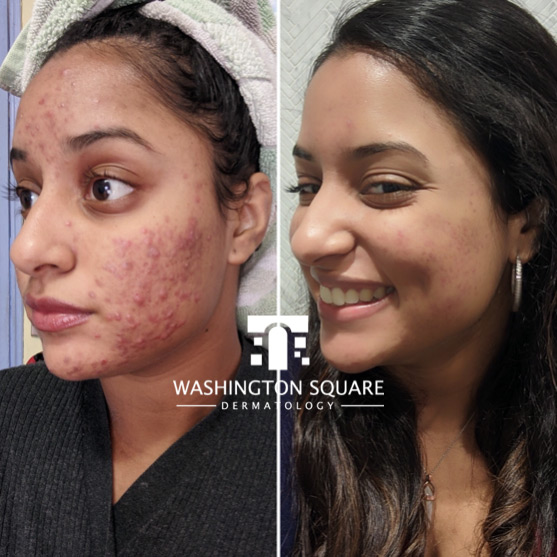
Finding the best acne treatment in NYC can be very difficult, but at Washington Square Dermatology we are fortunate to have some of the best acne doctors in NYC.
Dr. Jaber, Dr. Park and Susanna Franks, PA-C, understand how difficult living with acne can be and at Washington Square Dermatology we have treated thousands of acne patients to help them regain their confidence and self-esteem.
At Washington Square Dermatology we will meticulously assess your skin and obtain a history of your previous skin treatments to craft a comprehensive regimen precisely tailored to your skincare needs.
Based on your preferences and skin needs, this may include a combination of topical and oral therapies in addition to lifestyle changes to clear current acne and prevent future breakouts. We are also fortunate to offer Aviclear, the first FDA-cleared laser for the treatment of acne. Aviclear is a great option if you have failed or cannot tolerate traditional acne therapies.
It is important to obtain professional dermatology treatment as soon as possible as untreated acne can result in acne scarring. Please see our section on the best treatments for acne scars.
If you struggle with acne come to Washington Square Dermatology to have your skin evaluated by some of NYC’s top-rated acne dermatologists.
Acne is the most common skin disease in the United States affecting more than 85% of teenagers, and frequently continues into adulthood. 60% of those aged 20 to 29 years old and 40% of those aged 30 to 39 years old have visible acne. Acne can even affect those 40 and older.
Acne is not just a skin disease. Acne can negatively impact quality of life as popular culture and social media promote clear, perfect skin.
Acne may result in significant social, psychological, and emotional issues, similar to that of other medical conditions like asthma, diabetes, and epilepsy. Acne patients also have a much higher incidence of depression, lower self esteem, social withdrawal, and anxiety. Severe acne may increase the risk of unemployment.
Acne is a disease of the hair follicles, and there are four processes that have a pivotal role in the formation of acne:
Acne typically starts in early puberty when there is increased hormone production. Many factors can cause acne to flare, including the menstrual cycle, stress, clogged pores with greasy/oily products, clothing, steroid use, and excessive sweating. Genetic conditions like family history of acne and hormonal conditions like polycystic ovarian syndrome may also contribute to the development of acne.
Diet in some patients can influence acne. A diet high in simple sugars with high glycemic index, and dairy products (particularly low fat or skin milk) can worsen acne.
The diagnosis of acne is performed clinically.
Acne is characterized by different skin lesions and it can range from those with mild, moderate, or severe disease.
Photos courtesy of New England Journal of Medicine
The different types of skin lesions in acne include: open comedones, closed comedones, papules, pustules, nodules, and cysts.
There are many different treatment options for acne: ranging from topical antibiotics, medicated washes, topical retinoids, topical anti-inflammatories, oral antibiotics, and oral retinoids.
So many of our patients try and fail over-the-counter (OTC) products or online therapies. This delay in treatment for those with moderate to severe acne can result in acne scarring which can be difficult and expensive to treat.
Topical medications are the mainstay of treatment for mild to moderate acne patients and are used in combination with oral medications for more severe acne patients. Topical medications only work where applied and their main purpose is to prevent new acne, thus they should be used daily to prevent new acne.
As the most common side effect of topical medications is skin irritation or dryness, seeing an expert NYC acne dermatologist is important to expertly manage your medications. Keep in mind excessive scrubbing or washing can unfortunately increase oil production.
If you have questions about what acne moisturizers to try for acne prone skin, read this article where Dr. Samer Jaber discusses the best options for those with acne-prone skin.
Topical Retinoids
Topical retinoids are the mainstay of acne treatment as they work to both prevent and treat acne. They decrease blackheads and whiteheads while reducing cystic inflamed acne. Topical retinoids also improve discoloration and hyperpigmentation.
Topical Antimicrobials
Topical antimicrobials are very effective in the treatment of inflammatory acne and decrease P. Acnes bacteria. Benzoyl peroxide is an effective first line treatment and available OTC. Benzoyl peroxide can also be combined with topical antibiotics like clindamycin or erythromycin.
Other Topical Medications
Other topical medications available for the treatment of acne are OTC salicylic acid, sodium sulfacetamide sulfur, dapsone and azelaic acid. Each of these has unique properties that are best managed in combination with other topicals, and can be managed for you by our expert NYC acne specialists.
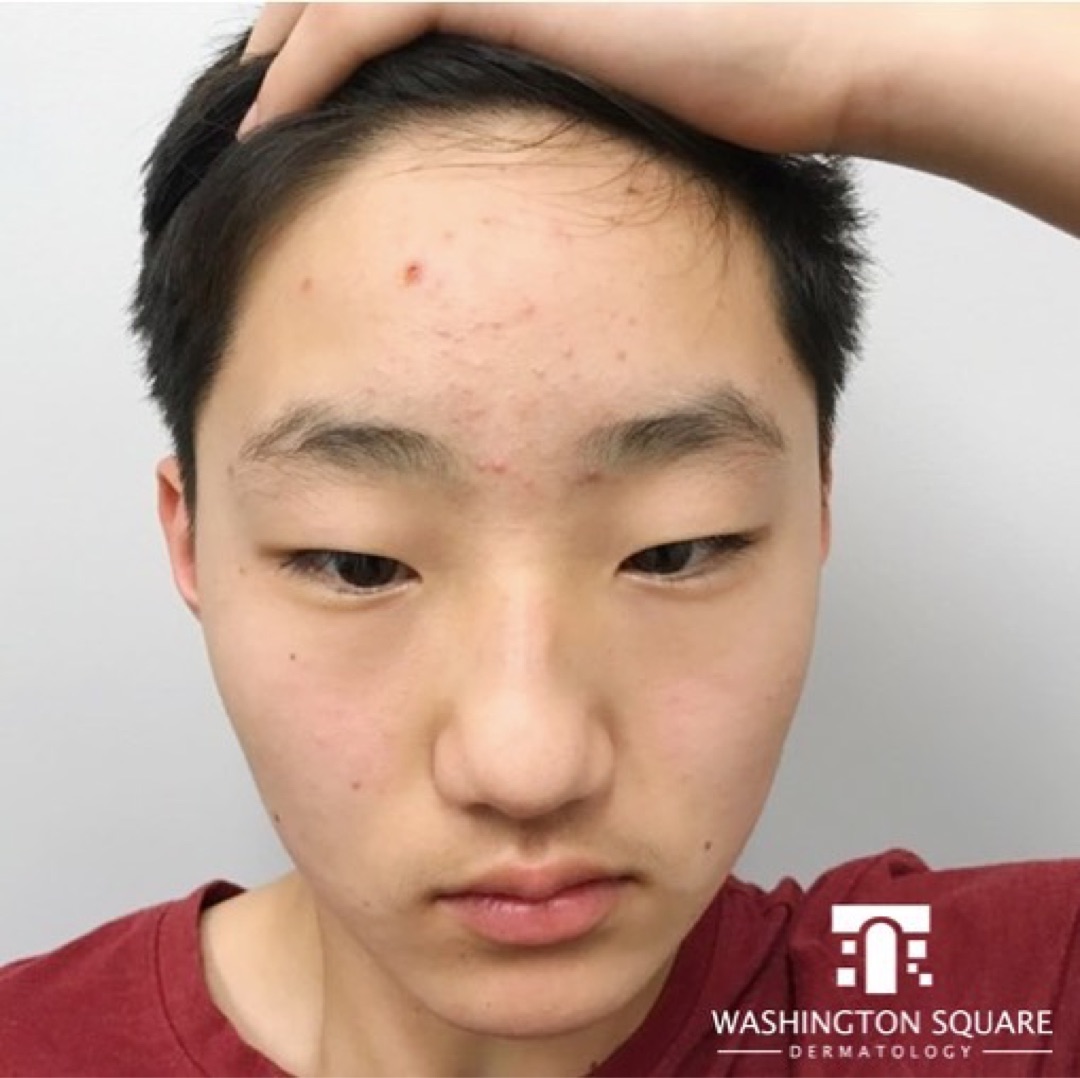
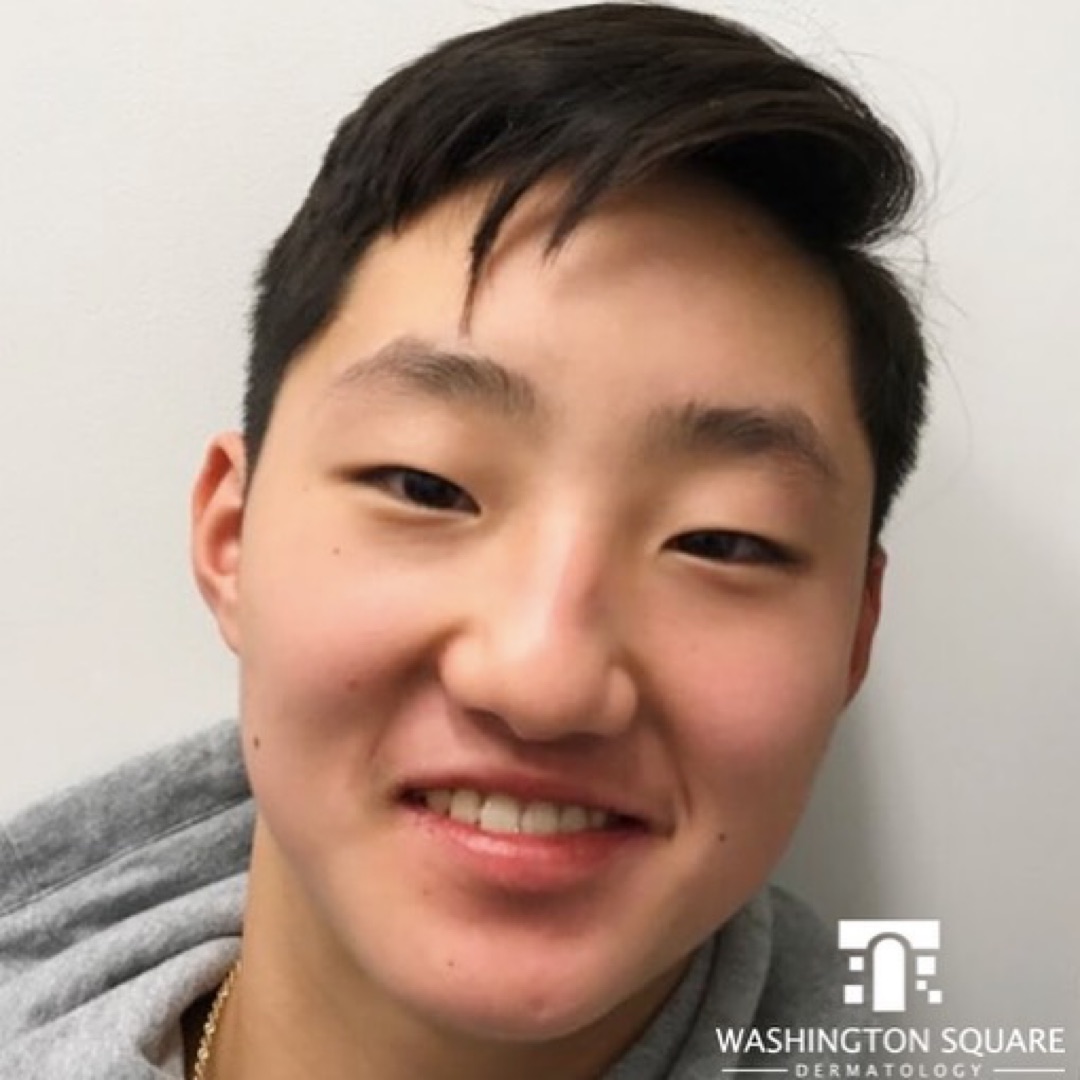
There are multiple oral treatments available for the treatment of moderate to severe acne including oral antibiotics, hormonal-based treatments and oral retinoids.
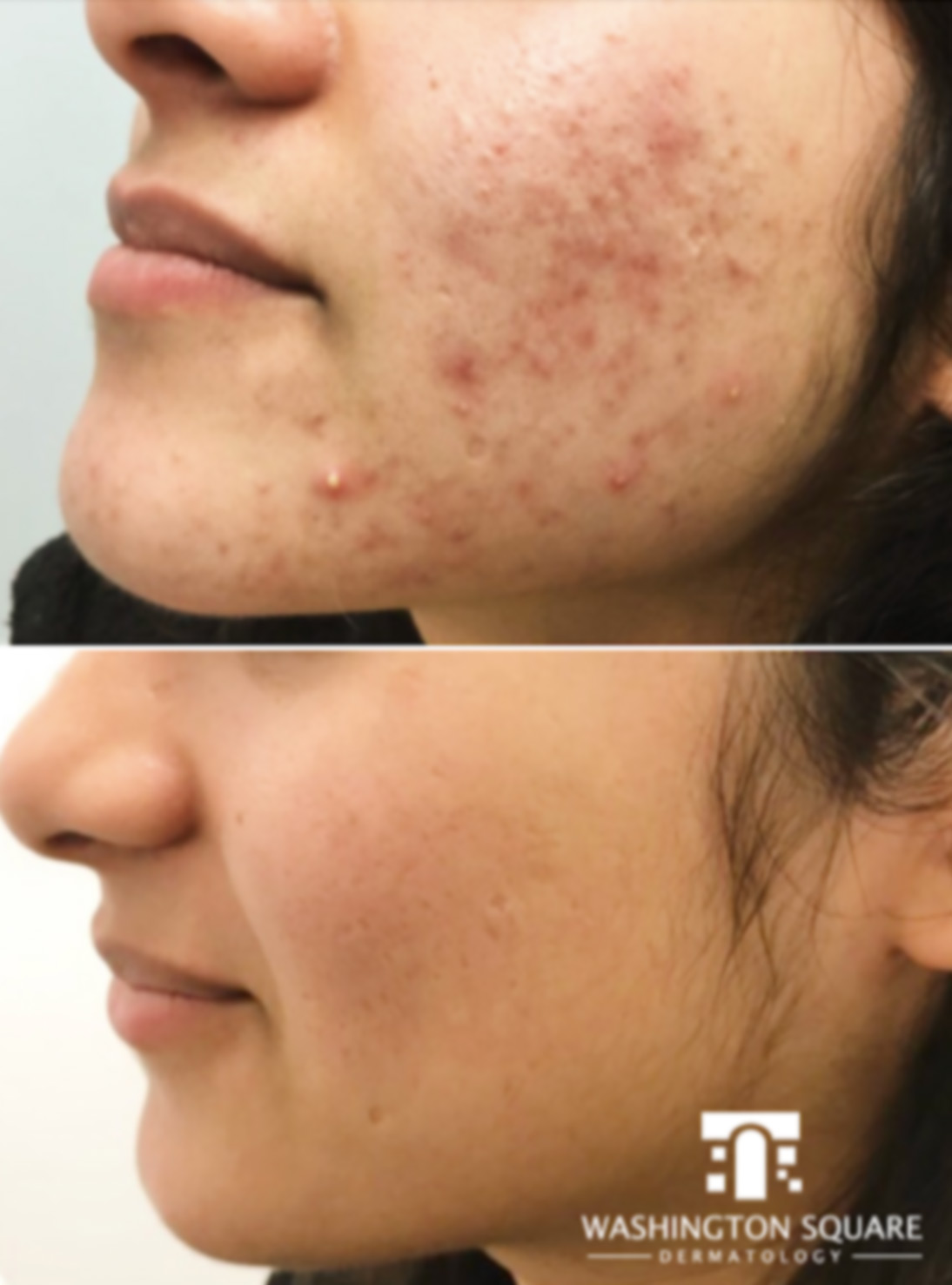
Antibiotics
Oral antibiotics are best for the treatment of moderate to severe acne or those with resistant acne or acne scarring. Long term use of oral antibiotics should be minimized as they can cause antibiotic resistance.
Hormonal therapies
In many women hormonal therapies may be an effective and safe long term treatment option for acne. Elevated levels of certain hormones can trigger hormonal breakouts in women, particularly painful, cystic, inflammatory acne on the lower face and jawline.
Combination oral contraceptive pills with estrogen and progesterone are often prescribed as they decrease sweat gland activity and regulate hormone levels.
Spironolactone is an oral anti-androgen that can be used in combination with birth control or alone. It can also be effective for the treatment of female pattern cystic acne on the jawline and lower face. Seeing an acne expert at Washington Square Dermatology that has expertise in managing oral hormonal therapies can be an effective way to manage hormonal acne.
For further information on hormonal acne, you can read these articles:
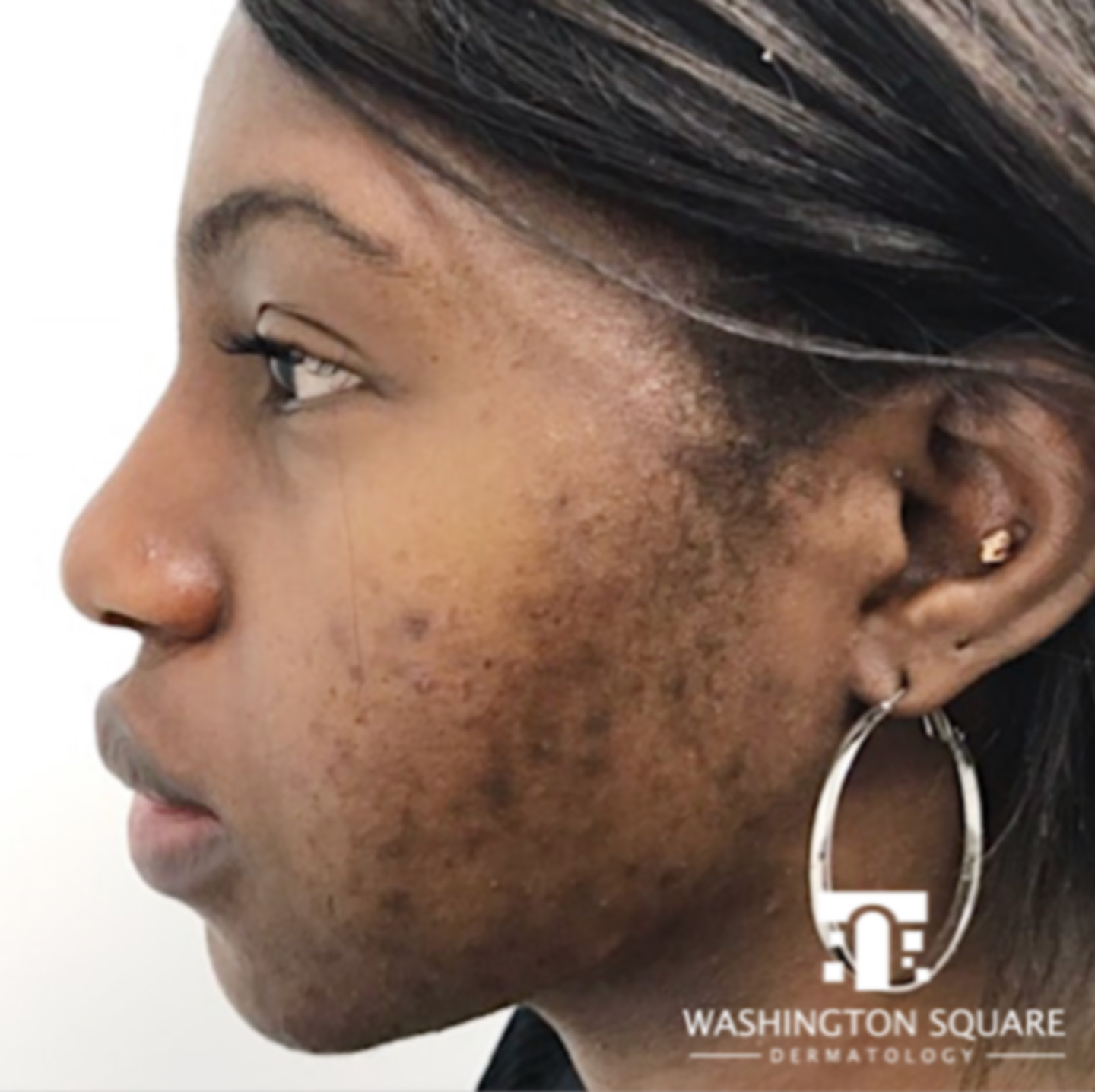
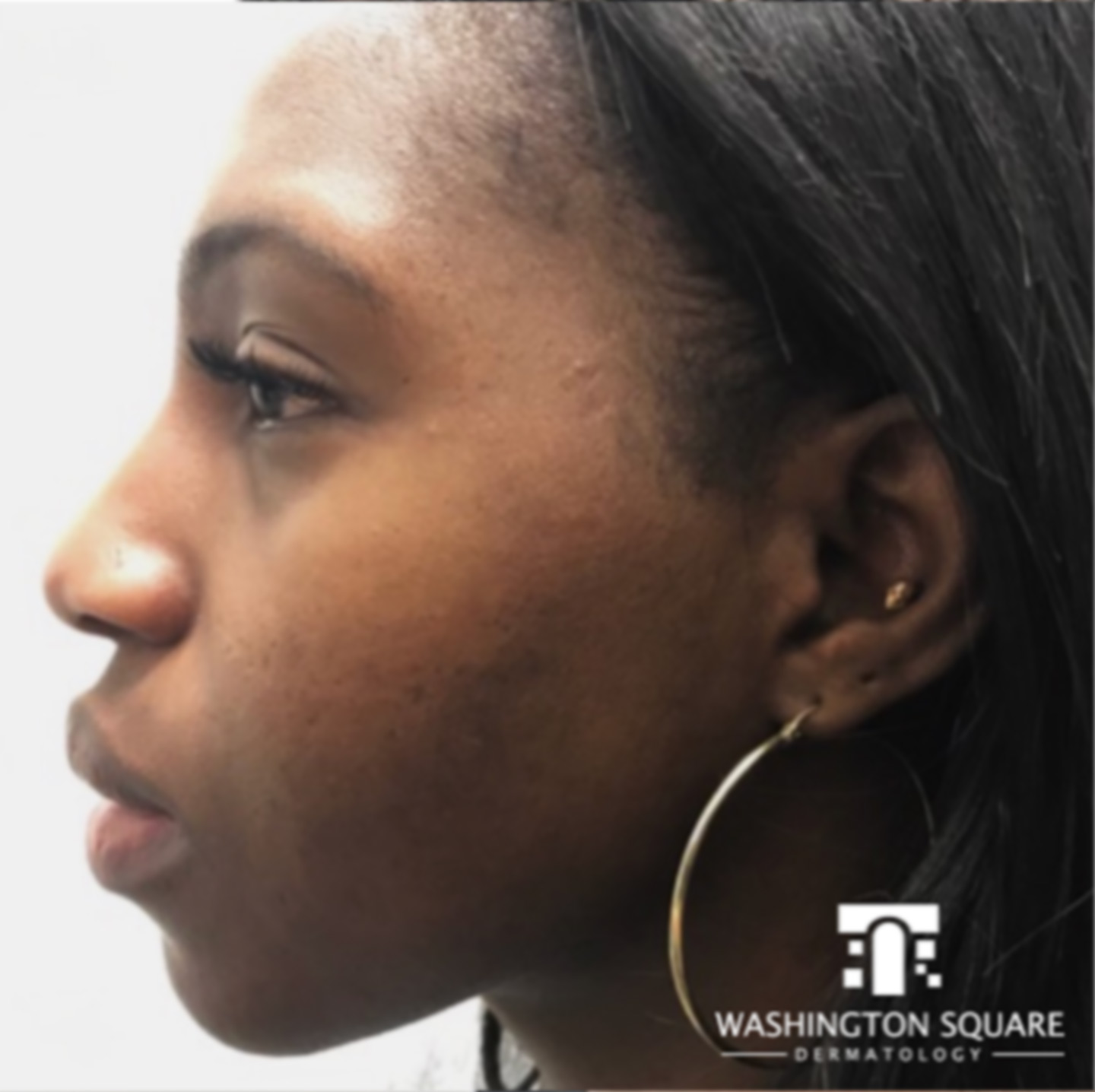
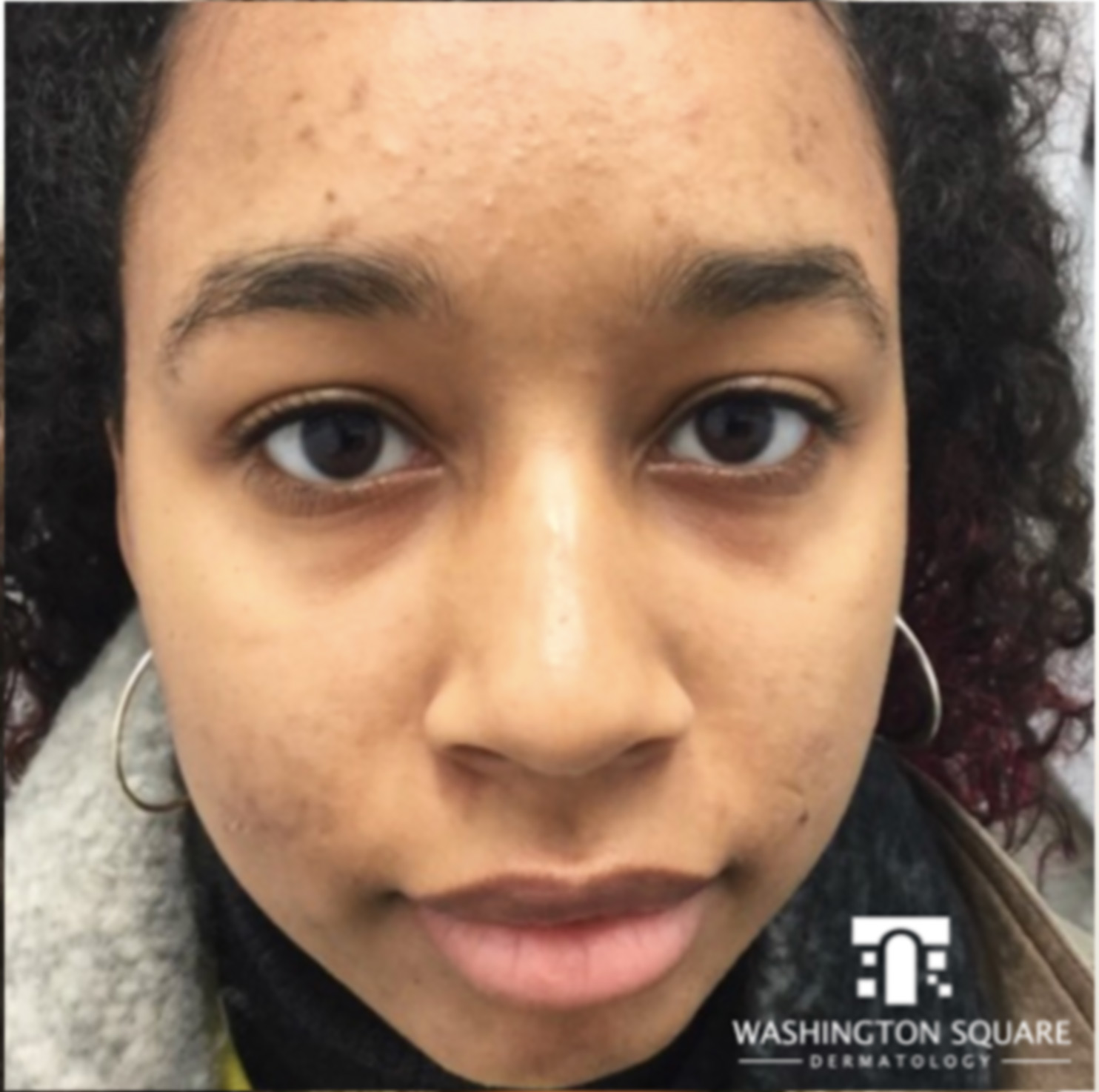
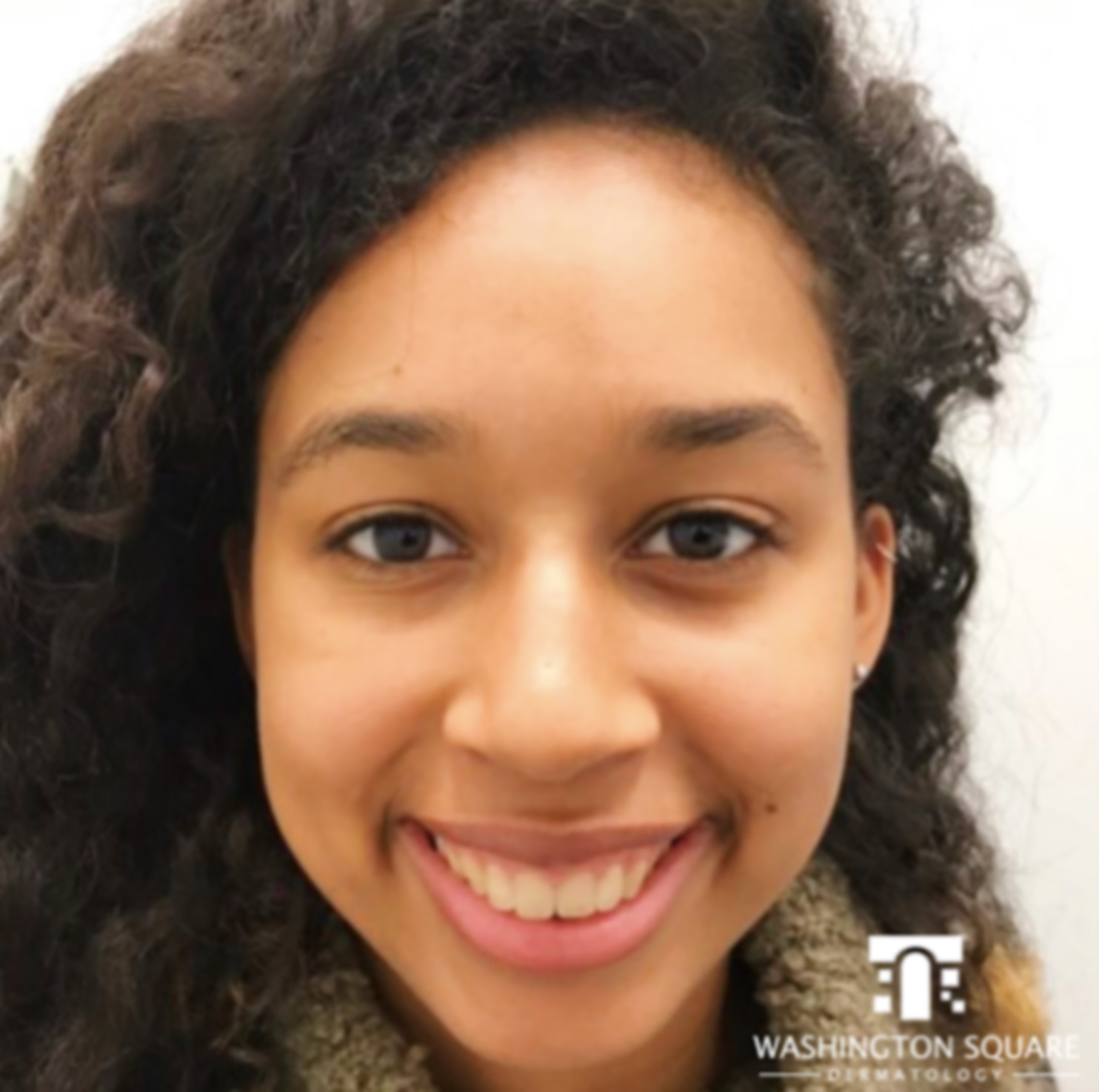
Oral isotretinoin or accutane is the most powerful acne treatment available. Patients with moderate to severe acne or acne that is difficult to treat or resulting in scarring are good candidates to use accutane.
Accutane is a medication which requires close monitoring and the supervision of experts. If you are thinking about going on Accutane or struggling with very difficult to treat acne, come see some of NYC’s best acne specialists at Washington Square Dermatology.
AviClear™ by Cutera is the first FDA cleared laser for the treatment of mild, moderate, and severe acne. It can be used for teens and adults and it is SAFE for all skin types.
An AviClear laser acne treatment is ideal for patients struggling with acne that have tried and failed topical and oral medications, or cannot tolerate oral or topical acne medications. Each treatment takes approximately 45 minutes, and is a series of 3 treatments performed one month apart.
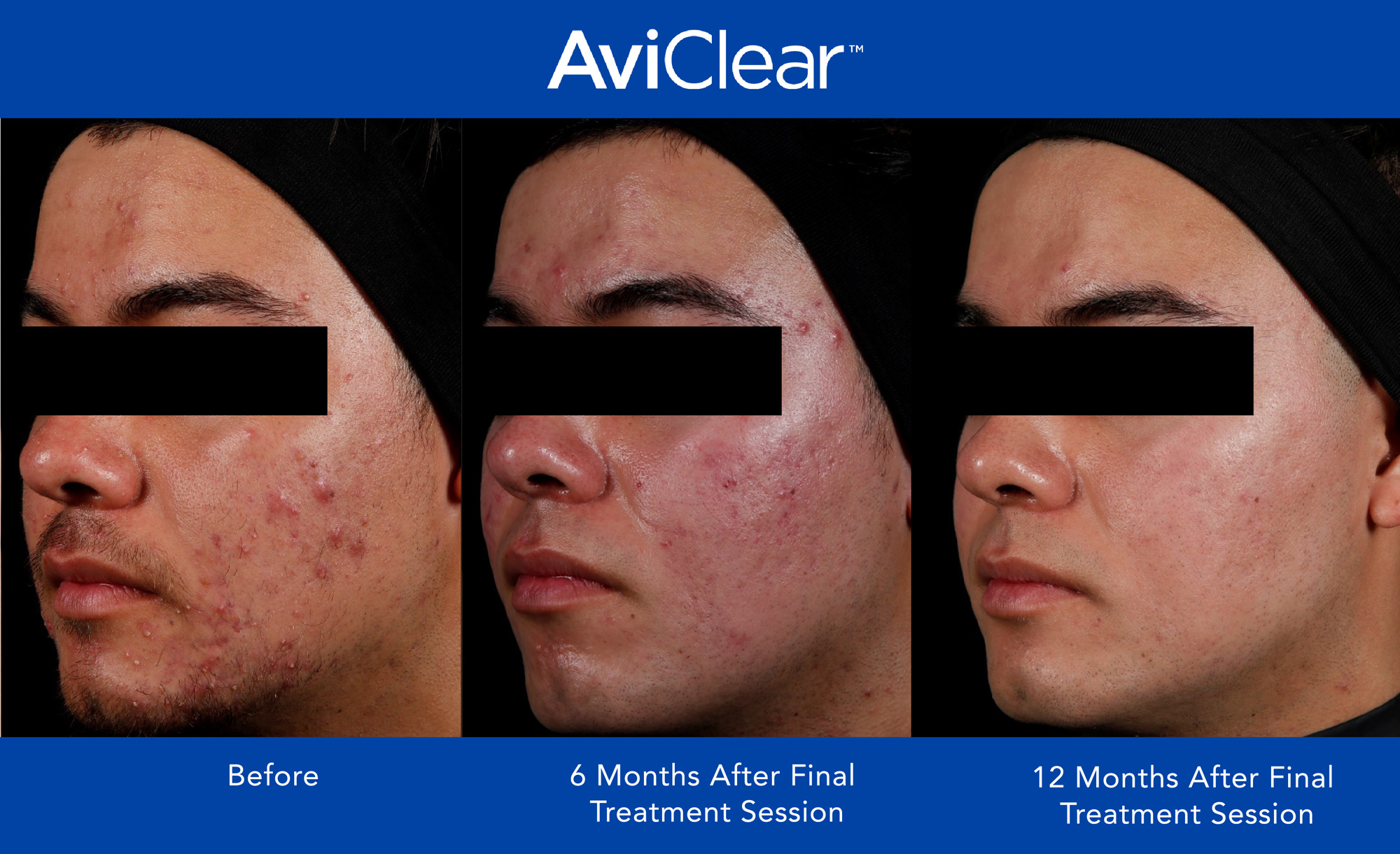
The AviClear laser uses an unique focused 1726 wavelength laser that targets the sebaceous glands in the skin. The laser energy suppresses sebaceous glands from making sebum (the oily substance on skin). By reducing the skin’s oil production, you have fewer blocked pores which improves existing acne and can prevent future breakouts. The precision of the AviClear laser ensures that the laser energy is focused on the sebaceous glands only while sparing surrounding skin. It also has a built-in cooling function, which makes the treatment more tolerable for patients.
The treatment process involves three quick 45-minute sessions that are typically spaced one month apart. First you clean and degrease the skin, there is no numbing cream used for Aviclear. Throughout the treatment we hydrate the skin with water and the AviClear laser is used to deliver energy to the entire face. The treatment is generally well-tolerated and generally there is minimal downtime.
In clinical studies, patients who received AviClear experienced significant improvement in their acne, with results lasting up to 12 months after the final treatment session. According to a study of 104 patients with moderate to severe acne, 80% of patients treated with AviClear saw at least half of their acne lesions resolve by three months after their third treatment session. 87% of patients saw at least half of their pimples clear at six months after their last session
AviClear laser treatment is safe for all skin types and has minimal side effects. During the treatment, patients may feel a snapping sensation. Post-treatment redness may occur but generally dissipates within a few days.
TRUSTED BY OVER
HONORED TO HAVE OVER
PRIVILEGED TO SEE PATIENTS FROM ALL
Most insurance companies actually cover acne visits and prescription medications for acne. It is always best to call your insurance company before your visit to determine what your co-pay, co-insurance, deductible or out of pocket expenses could be.
Oftentimes, prescription medications are actually cheaper than OTC products! For our patients, we use dermatology specialty pharmacies that make prescriptions much more affordable.
Mild acne can often be treated with OTC medications. If you have not reached your skin goals by 6 weeks, or if you have acne scarring, please see a dermatologist.
Absolutely not. We generally recommend washing the face twice a day and after a sweaty activity/workout; but having acne DOES NOT mean your skin is dirty.
Acne is more common in teenagers, but it can occur at any age. 40% of adults in their 30’s have acne. At Washington Square Dermatology, we frequently treat adult female hormonal acne.
If over-the-counter products are not working, if you have not reached your skin goals, or if you are developing acne scarring, please see a dermatologist.
The link between diet and acne is controversial, however, there is research showing that diets high in sugar (or a high glycemic index diet) or dairy (particularly skim or low fat milk) can worsen acne.
Absolutely!
Dark spots after acne can be targeted with prescription creams or in-office cosmetic treatments such as chemical peels.